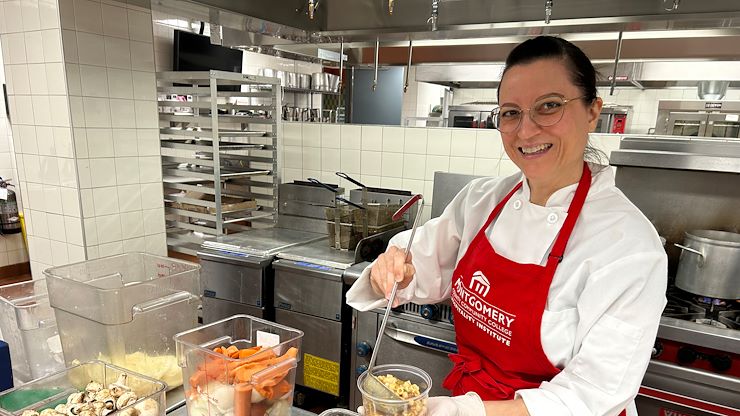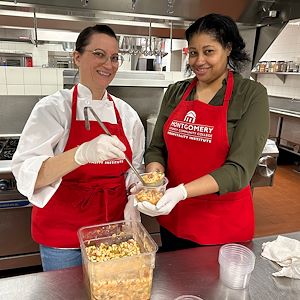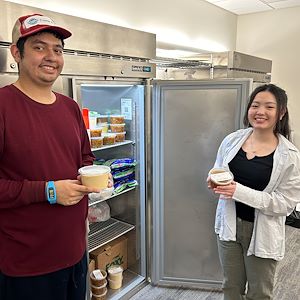
Food Sustainability Fellow in the Hospitality Institute Jennifer Fanega prepares healthy meals for the Stock Up for Success Food Pantry on Blue Bell Campus using excess foods from the Culinary Arts Program. Photos by Eric Devlin
During the fall 2023 semester, Food Sustainability Fellow in the Hospitality Institute Jennifer Fanega, recorded 470 pounds of food being sent to landfills from the Culinary and Baking and Pastry arts programs on the Blue Bell Campus. And it wasn’t just food scraps like potato skins or eggshells, or spoiled food being thrown out either.
“Food that was perfectly edible was being wasted,” said Karima Roepel, Director of the Hospitality Institute. “If the excess food couldn’t be strategically used, it was being thrown away. Some was being donated to Manna on Main Street or used for events, but so much was being thrown away. It breaks my heart really.”
 Determined to make a change, the two women have launched the Food Recovery Program.
Fanega has been preparing meals using excess foods from the cooking program and delivering
them to the Wellness Center.
Determined to make a change, the two women have launched the Food Recovery Program.
Fanega has been preparing meals using excess foods from the cooking program and delivering
them to the Wellness Center.
“Many students don't know how to cook, or don't have the time or ability to prepare meals for themselves and their families," said Fanega. “Far and away, providing a fully cooked meal ready to eat is going to be way more received and better utilized by the students who use the pantry.”
The new program has begun to reduce the amount of wasted food, help in the fight against climate change and curb hunger among a significant population of students on campus.
Curbing food insecurity
Fanega is an AmeriCorps Vista Fellow, who began working at the College in August 2023. The federally funded grant program focuses on fighting poverty.
A 2021 MCCC alumna, who graduated with a Liberal Studies degree, Fanega transferred to West Chester University to earn a bachelor’s degree in Nutrition with a concentration in Sustainable Food Systems Management in May 2023. She is also a trained natural foods chef and has worked for those facing health concerns and dietary restrictions.
A key component of the Food Recovery Program is combating food insecurity among students, she said. “Food insecurity is the lack of consistent access to healthy, safe, affordable and culturally acceptable foods that promote optimal health and wellbeing,” said Fanega. “The key words are consistent and equitable.”
In September 2020, MCCC’s Institutional Effectiveness & Strategic Innovation and Business Intelligence office conducted a student essential needs survey, which showed that 38 percent of respondents said they experience some level of food insecurity. The number today is estimated to be a larger percentage.
“That’s over a third of our students,” said Fanega. “There are even higher rates for women, nonwhite people, LGBTQIA+, single parents, and individuals with disabilities.”
Among the barriers to healthy foods includes not having the resources. Benefits from the Supplemental Nutrition Assistance Program (SNAP), previously known as food stamps, have been reduced while food prices have risen.
"Far and away, providing a fully cooked meal ready to eat is going to be way more received and better utilized by the students who use the pantry." –Jennifer Fanega, Food Sustainability Fellow in the Hospitality Institute
Combating climate change
A 2021 report by the U.S. Environmental Protection Agency “estimated that each year, U.S. food loss and waste embodies 170 million metric tons of carbon dioxide equivalent greenhouse gas emissions” and according to the USDA “when food ends up in landfills, it generates methane, an even more potent greenhouse gas.”
“We are contributing to climate change with our excess food, yet we have hungry students,” said Fanega.
She examined the culinary program’s operational practices during the fall semester to determine ways that the Hospitality Institute can operate more efficiently and sustainably. Then in January, a new inventory system was implemented to reduce waste.
The Food Recovery Program utilizes extra ingredients, as well as food that has been prepared by our students. The dishes Fanega prepares are typically vegan, to allow the largest number of students to eat them. Everything is packaged, labeled, and donated, and any inedible scraps are composted. “We are hiring a small, local, woman-owned company to collect our food scraps,” said Fanega. “It’s called Back to Earth Compost crew, based in Plymouth Meeting. They service pretty much all of Montgomery County. They take our scraps and bring them to a farm where they are turned into a nutritious soil amendment.”
“Any Montco student has access to the food pantry," said Fanega. “No proof of income or hardship is required. This reduces any stigma or shame that may come along with having to ask for help.”
Already paying off
The Food Recovery Program is still in its infancy, but word is spreading.
In the fall 2023 semester, the Food Recovery Program donated the equivalent of 937 meals. The Stock Up for Success Food Pantry saw 218 unique visitors with 979 visits, a 200 percent increase estimated over previous semesters.
Dr. Nichole Kang, Director of the Wellness Center, said the College has food pantries in Blue Bell and Pottstown.
“Once SNAP benefits were cut in March 2023, we saw an uptick,” she said. “We measured the first full month of spring 2023 and then again in the fall of 2023. That’s how we saw the 200 percent increase.”
Kang said a special QR code was created for students to sign in and that’s how they were able to track the 218 unique students.
Before Fanega began delivering meals, the options for healthy options were limited.
“The healthy part is key,” Kang said. “Now we have cauliflower chowder, beef and bean stew, miso soup. Those are healthy options you can pop in the microwave.”
Word of Fanega’s work has spread quickly among students.
“Students are absolutely following her down the hallway,” said Kang. Students say they appreciate the greater selection of options in the food pantry.
 “I think it’s a great idea,” said My Ly, a Mechanical Engineering major, who works for the food pantry in a federal work-study position. “I think it’s
a closed loop process where students’ needs are met by programs that students are
learning and running. I think it’s definitely a program that’s well loved by our students
here.”
“I think it’s a great idea,” said My Ly, a Mechanical Engineering major, who works for the food pantry in a federal work-study position. “I think it’s
a closed loop process where students’ needs are met by programs that students are
learning and running. I think it’s definitely a program that’s well loved by our students
here.”
Jose Escalante, a Business Administration major, who’s pursuing an Office Management Certificate, said he appreciates the food that’s coming in to the pantry.
“I’m really glad this is here to help out all of our students here at the College,” he said.
Roepel had only glowing thoughts about the program’s early success.
“This makes me happy,” said Roepel. “Feeding hungry people is a passion of mine. I’d like this program to continue.”
Fanega said she’s proud of the work the program has done in a short amount of time.
“Change requires inspiring and educating people,” she said. “If people knew how prevalent food insecurity is, and how food waste effects climate change, I think they'd be willing to make small changes since they can have such a big impact.”
Next steps
Both Roepel and Fanega said there is plenty more to be done, most importantly continuing to educate the community about the importance of food conservation.
“That’s a goal going forward,” said Fanega. “The education piece. Getting in front of students and saying, ‘This is why we do this this way’ to explain the why and how to get involved.”
Ideas about how to expand the program include the creation of a Food Recovery Club that students can join. They can learn and join in the process in the kitchen and the food pantry. When volunteering, students can learn real-life food preparation skills that can help them put healthy dinners on their own tables.
Roepel and Fanega also are working to expand the recovery efforts to include outside sources of food. In partnership with the North Penn High School chapter of Sharing Excess, MCCC is planning a free food distribution event for Tuesday, April 9.
Sharing Excess is a non-profit organization that recovers perfectly good produce from the food distribution center and distributes it to those in need.
“Sharing Excess is great, because in the supply chain, whole pallets of produce can be sent to landfill just because a few items in that shipment have started to become over-ripe,” said Kang. “Sharing Excess diverts the edible food, helping neighbors and our environment.”
That’s just the start of the work Fanega and Roepel have planned for the future.
“With the new Hospitality Institute opening soon, Karima and I have plenty of ideas to work sustainability in the building,” said Fanega. “The biggest priority is getting there.”
To get involved and volunteer with the Food Recovery Program, contact Jennifer Fanega.
